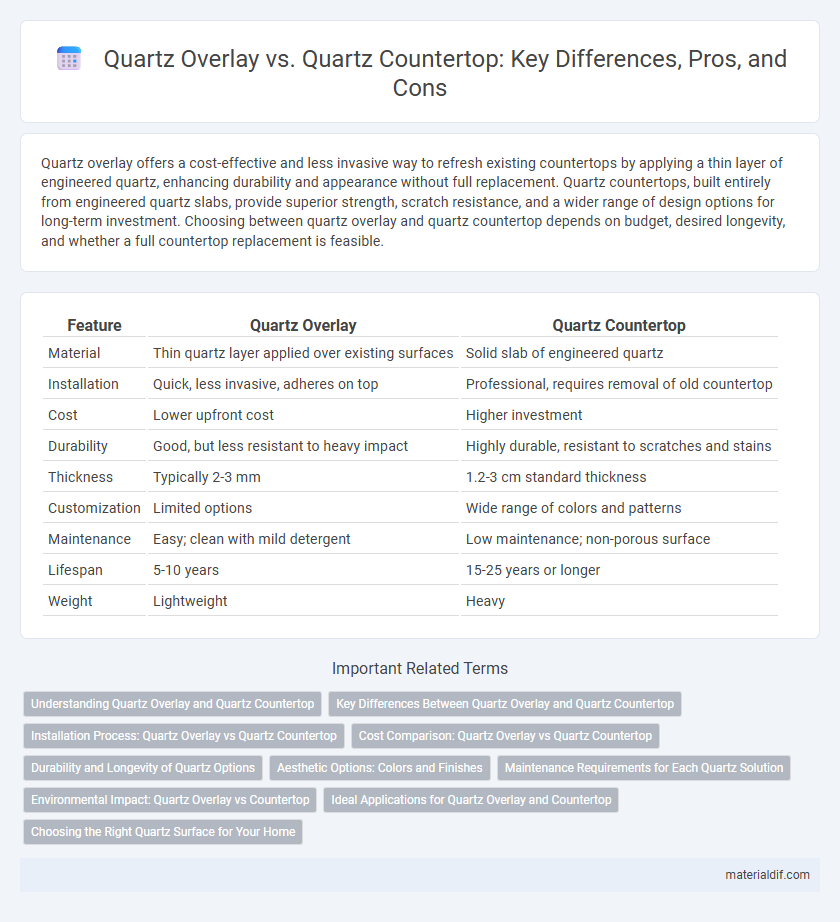Quartz overlay offers a cost-effective and less invasive way to refresh existing countertops by applying a thin layer of engineered quartz, enhancing durability and appearance without full replacement. Quartz countertops, built entirely from engineered quartz slabs, provide superior strength, scratch resistance, and a wider range of design options for long-term investment. Choosing between quartz overlay and quartz countertop depends on budget, desired longevity, and whether a full countertop replacement is feasible.
Table of Comparison
| Feature | Quartz Overlay | Quartz Countertop |
|---|---|---|
| Material | Thin quartz layer applied over existing surfaces | Solid slab of engineered quartz |
| Installation | Quick, less invasive, adheres on top | Professional, requires removal of old countertop |
| Cost | Lower upfront cost | Higher investment |
| Durability | Good, but less resistant to heavy impact | Highly durable, resistant to scratches and stains |
| Thickness | Typically 2-3 mm | 1.2-3 cm standard thickness |
| Customization | Limited options | Wide range of colors and patterns |
| Maintenance | Easy; clean with mild detergent | Low maintenance; non-porous surface |
| Lifespan | 5-10 years | 15-25 years or longer |
| Weight | Lightweight | Heavy |
Understanding Quartz Overlay and Quartz Countertop
Quartz overlay is a thin, durable layer applied over existing surfaces to enhance appearance and protect underlying materials, while quartz countertop refers to a solid slab made from engineered quartz mixed with resins for a robust, non-porous, and low-maintenance surface. Quartz countertops offer superior durability, scratch resistance, and design flexibility compared to overlays, which are more budget-friendly and easier to install but less resilient. Selecting between quartz overlay and quartz countertop depends on the desired balance of cost, durability, and installation complexity for kitchen or bathroom surfaces.
Key Differences Between Quartz Overlay and Quartz Countertop
Quartz overlays provide a thin, durable layer that is applied over existing countertops, offering a cost-effective and less invasive upgrade option. Quartz countertops are solid slabs made from engineered quartz, delivering superior strength, durability, and a seamless appearance ideal for kitchen and bathroom installations. Key differences include installation complexity, thickness, long-term durability, and cost, with quartz countertops generally providing enhanced performance and longevity compared to quartz overlays.
Installation Process: Quartz Overlay vs Quartz Countertop
Quartz overlay installation involves adhering a thin layer of quartz directly over existing surfaces, minimizing demolition and reducing project time significantly. Quartz countertop installation requires removing old countertops and securing a full-thickness slab onto the cabinets, demanding precise measurements and professional handling due to the material's weight and rigidity. The overlay process is less invasive and often more cost-effective, while countertop installation provides a seamless and durable finish ideal for full kitchen renovations.
Cost Comparison: Quartz Overlay vs Quartz Countertop
Quartz overlays typically cost between $40 and $65 per square foot, making them a budget-friendly option for updating existing surfaces without the need for full replacement. In contrast, quartz countertops range from $70 to $120 per square foot, reflecting higher material and installation expenses due to their durability and customization options. Choosing between a quartz overlay and a quartz countertop depends largely on budget constraints and the desired longevity of the surface.
Durability and Longevity of Quartz Options
Quartz countertops offer exceptional durability due to their engineered composition of natural quartz crystals and resin, making them resistant to scratches, stains, and heat. Quartz overlays, while providing a surface refresh by layering over existing countertops, typically exhibit less longevity and may be more prone to wear over time compared to solid quartz countertops. The longevity of quartz options is significantly influenced by the thickness and installation quality, with solid quartz countertops outperforming overlays in long-term durability.
Aesthetic Options: Colors and Finishes
Quartz countertops offer a wide variety of aesthetic options, including rich colors and diverse finishes such as polished, honed, and matte, which enhance modern kitchen designs. Quartz overlays provide a cost-effective alternative by adding a thin, decorative quartz layer over existing surfaces, available in fewer color choices and typically limited to standard finishes. Both options deliver durability and style, but quartz countertops allow for more customization in color and texture to match specific design preferences.
Maintenance Requirements for Each Quartz Solution
Quartz countertops require minimal maintenance, needing only regular wiping with mild soap and water to prevent staining and preserve their glossy finish. Quartz overlay, applied as a thin layer over existing surfaces, demands more careful cleaning to avoid damaging the thin quartz layer, using non-abrasive cleaners and avoiding heavy impacts. Both solutions offer durability, but quartz countertops generally provide a more robust, easier-to-maintain surface compared to quartz overlays.
Environmental Impact: Quartz Overlay vs Countertop
Quartz overlays provide an eco-friendly alternative by utilizing less raw material compared to full quartz countertops, reducing stone quarrying and waste. Quartz countertops typically involve higher energy consumption during manufacturing due to their thickness and fabrication processes. Choosing quartz overlay can lower the environmental footprint while maintaining durability and aesthetic appeal.
Ideal Applications for Quartz Overlay and Countertop
Quartz overlays are ideal for resurfacing existing countertops, offering a cost-effective solution for kitchen or bathroom renovations without full replacement. Quartz countertops provide durable, non-porous surfaces perfect for high-traffic areas requiring heat resistance and easy maintenance. While overlays excel in cosmetic upgrades on stable bases, quartz countertops ensure long-term durability and structural integrity in new installations.
Choosing the Right Quartz Surface for Your Home
Quartz countertops offer a durable, non-porous surface ideal for kitchen and bathroom applications, providing resistance to stains, scratches, and heat. Quartz overlays, designed as a thin layer applied over existing surfaces, provide a cost-effective renovation option with easy installation and a sleek aesthetic. Selecting between quartz countertops and overlays depends on factors like budget, installation complexity, and desired longevity to ensure the best fit for your home improvement project.
Quartz Overlay vs Quartz Countertop Infographic

 materialdif.com
materialdif.com